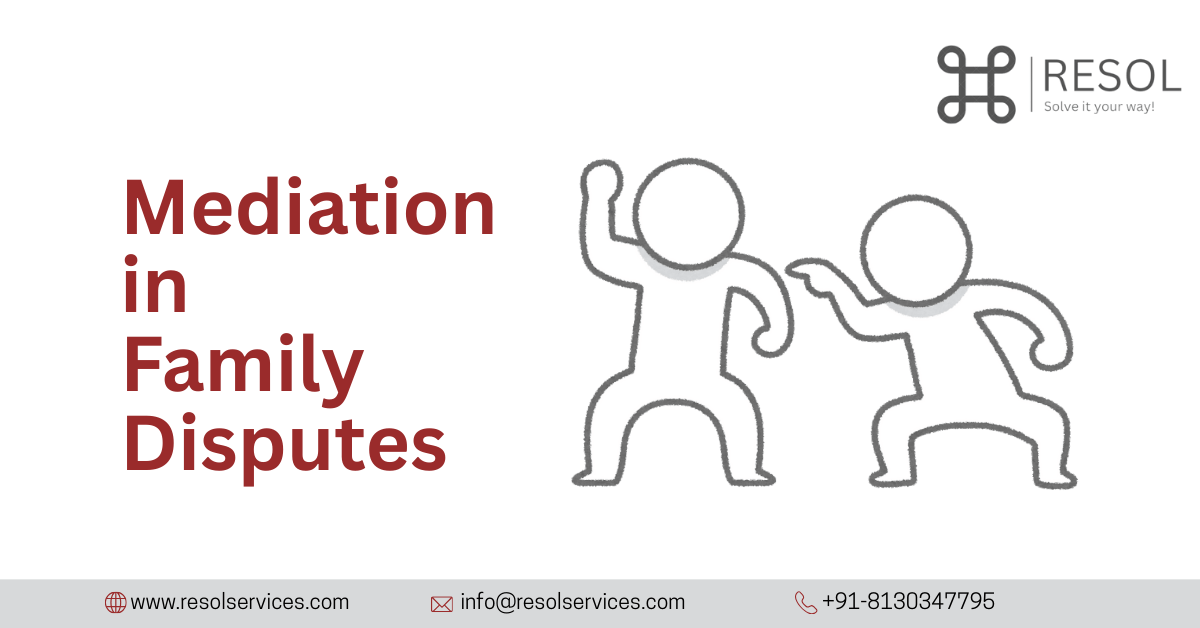Mediation is a confidential and a voluntary process in which a third party is involved, generally known as a mediator. The mediator is a neutral person who helps the parties to resolve the disputes mutually and reach a solution. This method of solving disputes is not only time efficient but also cost efficient as it reduces the unnecessary stress from the hectic court proceedings as well as saves money and time.
Mediation & Family Disputes
Mediation in family disputes can be done on various matters like Marriage and Divorce related issues, Property related issues, Child custody, Adoption etc. As per the statistics in India it can be seen that out of total 46,000 of court referred mediation cases around 41530 cases were family disputes. As compared to other disputes family related disputes are mostly referred to mediation. The reason behind it is the nature of family disputes as such kinds of disputes involve a lot of human sentiments and emotions and thus communication between parties is the first and the foremost need. In India there are various legislative provisions which give backing to courts for referring matters to mediation which include Section 89 of CPC, Section 9 of Family Court Act, 1984, and Section 23 of Hindu Marriage Act. These provisions make it clear that in India there is nowhere in law a mandatory requirement for referring matters to mediation and it is a fully discretionary power to the court. However in principle mediation proceeding can never be binding upon the parties unless agreed by the parties to be. Also in the case of court referred mediation unless a settlement deed resulting from the mediation is signed by both the parties and submitted to the courts it will not become binding upon the parties.
Process to be followed during a family dispute mediation
- PREPARATION: Before the mediation process begins, the mediator meets the parties and mentors them about the steps and the whole procedure and also clears various doubts and answers the question if any.
- INTRODUCTION: Mediator will give the opening statement and will explain his role and then he will ask whether both the parties agree to the process or not. If the parties agree for the mediation process then further steps will be followed. However if parties refuse a small sanction will be imposed by court for refusing.
- STATEMENT OF THE PROBLEM: The mediator gives opportunity to both the parties to present their views during the opening statement. The main cause behind this is to understand the problem from the perspective of both the parties.
- JOINT DISCUSSION: The mediator will have discussions with both the parties and figure out the issues that need to be addressed first.
- PRIVATE DISCUSSION: After the joint discussion both the parties will have the opportunity to discuss their concern in private with the mediator along with their lawyers if they want so. It is a crucial step which helps the parties to reach a negotiation.
- NEGOTIATION: The parties negotiate until they reach an agreement which is acceptable to both sides. The mediator then provides a solution which is acceptable to both the sides however if the negotiation is failed than the matter is referred to the court.
- AGREEMENT: When the terms of agreement are decided parties will reassemble and the mediator orally confirms the terms of the settlement after that these terms and conditions would be written and signed by the parties and the settlement or the compromise dispute will be submitted in the court. After the submission it becomes binding and enforceable by the court.
Required Documents
Relevant documents must be taken which are required as par with the issue of the mediation. For instance,
- In Property Issues: Mortgage deed or lease deed or any other document related to ownership of the property.
- In Divorce and Marriage related issues: Marriage certificate, other documents related to divorce proceedings.
- In Child Related Issues: Birth certificate, school records, custody order etc.
There must be enough copies of all documents for the mediator and other parties involved and advnce submission must be made of the documents.
Conclusion
Nowadays Mediation is emerging as a preferred mechanism and the advocate of mediation prefer it over litigation for resolving disputes especially the family disputes because of its ability to preserve the Family Relationships and it also shields children as well as the parties from the traditional methods of divorce and other custody proceedings and ensures speedy resolution. Thus basically it aligns with the principle of the timely justice, which is essential in resolving any type of conflict.
FAQS
- What is the duration of the Mediation process?
The duration of the mediation generally depends upon the complexity of the cases. While some cases are resolved in few hours but other might take a few days or even longer.
- What is the success rate of Mediation?
Mediation generally has a higher success rate in resolving the issues as compared to other methods. Even if the parties are unable to reach full agreement usually the process results in the improvement of the situation and the relationship of the respective parties.
- Should I be nervous for Mediation?
Initially Mediation can be an intimidating process but if approached with correct mindset and confidence there are higher chances of a better and speedy solutions of the problems.


Very good